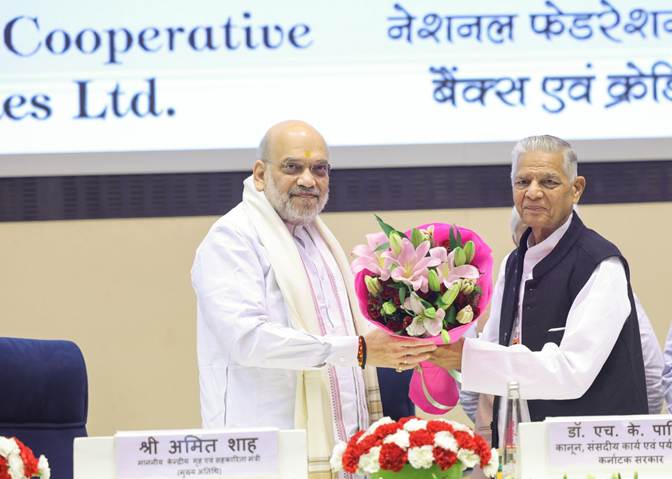Union Home Minister and Minister of Cooperation Amit Shah on Monday said the government is committed to expanding the urban cooperative credit ecosystem and will set up an Urban Cooperative Bank in every city with a population of over 2 lakh within the next five years.
Addressing the international conference on the urban cooperative credit sector — Co-Op Kumbh 2025 — in New Delhi as the Chief Guest, Shah said the event marks the International Year of Cooperatives and will play a key role in charting a roadmap to scale and modernize the cooperative banking ecosystem. He added that the ‘Delhi Declaration 2025’, adopted at the conference organized by NAFCUB, will serve as a strategic blueprint for expanding and strengthening Urban Cooperative Banks (UCBs) across the country.
During the event, the umbrella organization launched Sahkar Digi-Pay and Sahkar Digi-Loan applications that will enable even the smallest UCBs to offer digital payment and loan facilities. Shah said these apps will symbolize the cooperative sector’s participation in India’s digital revolution.
Modernisation push, NPA reduction
Highlighting reforms since the formation of the Ministry of Cooperation under the Modi government, Shah said several policy steps have been taken to modernize cooperatives, resolve long-standing issues, and broaden their reach. He noted that state governments have adopted model bylaws for Primary Agricultural Credit Societies (PACS).
The ministry has set four core goals, including connecting youth with the cooperative movement through initiatives like the newly established Tribhuvan Sahkari University.
Shah also emphasized that cooperative societies must be prepared to meet emerging challenges and adopt multi-sector approaches in their operations.
The home minister cited achievements in financial discipline, stating that NPAs in the sector have been brought down from 2.8% to 0.6% over the past two years. “Establishing one urban cooperative bank in every city will be possible only when we work toward converting cooperative societies into banks,” he said.
Cooperatives driving inclusive growth
The home minister said cooperatives play a critical role in strengthening small traders, entrepreneurs, and youth, and empowering the weaker sections of society. GDP figures alone, he said, cannot reflect national progress unless every citizen’s livelihood and quality of life improves — something cooperatives help achieve.
Amul & IFFCO: Global leaders in cooperative model
Shah said India’s cooperative success is globally acknowledged, pointing to the International Cooperative Alliance ranking Amul and IFFCO as the world’s top two cooperative organizations.
Amul, he noted, has 3.6 million farmer members — over 65% of them women — and clocked a ₹90,000 crore turnover in 2024–25 by collecting 30 million liters of milk daily through 18,000 village societies and 18 district unions.
IFFCO, the second-largest cooperative globally, reported a turnover of ₹41,000 crore and ₹3,000 crore in profit, serving over 5 crore farmers through 35,000 member societies. The organization produced 93 lakh metric tonnes of fertilizers including urea and DAP, and its nano urea and nano DAP products are now exported to 65 countries.














